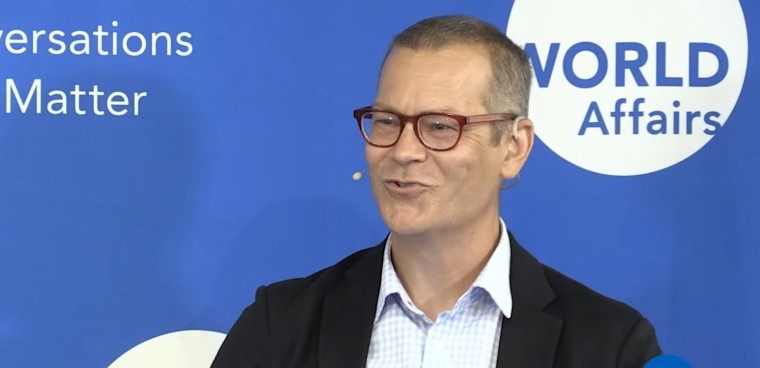If you have read other backgrounders on this site, Colin Kahl’s dossier will seem familiar. He is yet another individual whose background suggests he has been compromised by the Chinese Communist Party (CCP). He may be serving in the government of the United States, but there is a very real question as to whose interests he has at heart.
Colin Kahl is the new Undersecretary of Defense for Policy. He came to this administration from a stint with an institute with very troubling ties to the CCP. Such entities, part of China’s United Front activities, focus on coopting foreign elites and are a dime a dozen now in the United States. Our policies have made the Chinese rich, and that wealth has bought a lot of influence.
From early 2018 until his recent appointment, Kahl worked at the Freeman Spogli Institute for International Studies at Stanford University. That institute runs the Stanford Center at Peking University in Beijing.
Peking University, is run by former Beijing spy chief Qiu Shuiping. The school has been connected to multiple espionage cases in the United States. Its charter requires employees to swear loyalty to the Chinese Communist Party. Its employees and students are, of course, subject to the ubiquitous Chinese internal surveillance system which monitors the behavior of all Chinese citizens. [i]
As noted by the Washington Examiner when Qiu was appointed in 2018, “Qiu’s appointment also suggests an increasing strategic focus on incorporating academia into the state intelligence apparatus. This is of particular note at Peking University due to the thousands of international students who study there every year. The MSS and other Chinese intelligence services actively target these students for recruitment, attempting to persuade them to join government agencies once they return to their home nations. We should expect those efforts to escalate.”[ii]
Scholars at Risk, an organization that monitors academic freedom on campuses around the world, says that since 2018 there have been at least 10 attacks on academic freedom at Peking University. He Weifang, a law professor at Peking University, said faculty members are required to have lecture plans and conference presentations approved by the Communist Party Committee and that classrooms are monitored by cameras and facial-recognition software. [iii][iv]
The Department of Education is now investigating Stanford for failing to report the sources of over $67 million in donations from China since the Peking institute opened in 2012. In a letter to Stanford, the Department of Education specifically questioned whether the undisclosed Chinese funding to the school was linked to the Peking University center run by the Freeman Spogli Institute.
“As Stanford must know, Peking University is directly controlled by Chinese Communist Party officials and recently even amended its charter to reinforce its long-standing role as a tool of the Chinese communists.”
The letter from the Department of Education also noted that the Stanford Center at Peking University’s website “features a full-page banner image of Stanford students and faculty posing in front of a [People’s Republic of China] monument commemorating the ‘front of the old railroad tracks in Dandong, Liaoning province, that helped transport Chinese troops into North Korea during the Korean War.'” Thirty thousand American troops died fighting the Communist Chinese in that war.
In 2020 Stanford accepted $58 million from an organization known as the Committee of 100. The cash came in the form of an award for the school’s “Advancement in U.S.-China Relations.” The Committee of 100 is a pro-Beijing group, which pushes CCP narratives in the United States. [v][vi]
A primary focus of the Committee of 100 is the protection of Chinese spies from investigation and prosecution. In 2017 it published a white paper critical of American efforts to crack down on Chinese spies and branding such efforts as racially prejudiced. Such accusations are intended to make it more difficult for federal authorities to investigate Chinese nationals. [vii][viii]
The Australian Strategic Policy Institute, a national-security think, has warned that Peking University partners with the Chinese military and cautioned groups partnering with the school that it is “high risk”.
“Peking University (PKU) is designated high risk for its involvement in defence research and links to China’s nuclear weapons program,” the think tank said on its China Defence Universities Tracker site.
In recent years the FBI has interviewed at least five students of Peking University as part of investigations into Chinese espionage in the United States. Last year a former researcher at Peking University pleaded guilty to spying on the United States for Communist China. In 2010 a chemistry professor at the university was convicted of stealing trade secrets from DuPont Chemicals. [ix]
All of this is occurring against the backdrop of a broader counterintelligence focus on the extent to which the Chinese have used academia as a means of penetrating the United States, stealing secrets and acquiring influence. As noted by NPR, “Once cast as a way for America’s best and brightest to build relationships with and improve understanding of China, academic programs and collaborations are now falling under scrutiny. FBI agents have been lobbying U.S. university administrators to monitor Chinese researchers and students working in certain science and technology fields. Federal funding agencies including the National Institutes of Health are also investigating academics for not properly disclosing Chinese funding or research done with Chinese institutions.”[x]
One can search in vain for any evidence that either the Freeman Spogli Institute or the Stanford Center at Peking University voice any criticism of the policies of the Chinese Communist government. What one can find in spades, however, are articles and publications that read like they came straight out of CCP talking points. China is praised for its one child policy and taking the lead on climate change. The United States by contrast is scolded for its “Anti-Chinese racism” and, of course, overall systemic racism. For good measure efforts to determine the true origins of COVID-19 are branded conspiracy theories.[xi][xii]
Colin Kahl’s association with the pro-disarmament Council for a Livable World should also be of grave concern.
This Washington DC based organization has lobbied for US nuclear and conventional disbarment since 1962. The organization has helped to elect more than 400 US Senators (including Joe Biden) and Congressmen in that time[xiii] and claims credit several defense policy initiatives[xiv] – all detrimental to US interests.
The organization was founded by former Manhattan Project scientist Leo Szilard – a youthful supporter of Hungarian communist leader Bela Kun.[xv]
According to Pavel Sudoplatov, former wartime director of the Administration for Special Tasks, an elite unit of the Soviet intelligence service, Leo Szilard knowingly supplied information to Soviet contacts during his work on the Manhattan Project
Sudoplatov claimed in his 1994 book “Special Tasks, Memoirs of an unwanted witness-A soviet Spymaster”
“In 1946, [Stalin’s spy chief] Beria issued orders to stop all contacts with our American sources in the Manhattan Project; the FBI was getting close to uncovering some of our agents. Beria said we should think how to use…Szilard, and others around them in the peace campaign against nuclear armament.
Disarmament and the inability to impose nuclear blackmail would deprive the United States of its advantage. We began a worldwide political campaign against nuclear superiority, which kept up until we exploded our own nuclear bomb, in 1949. Our goal was to preempt American power politically before the Soviet Union had its own bomb. Beria warned us not to compromise Western scientists, but to use their political influence.”[xvi]
In 1962 Szilard founded the Council for Abolishing War which was later renamed Council for a Livable World.
According to a treatise on Szilard by William Lanouette presented at the 10th November 2005 at the World Science Forum, Budapest:
After the Cuban petition fiasco, Szilard tried a new approach. How, he wondered, could he become a Washington insider? Szilard’s answer led him to his first and only popular and democratic political effort. In 1962, he founded the Council for a Livable World to raise money for U.S. Senators who favored arms-control treaties. By Szilard’s calculus, all states had two Senators, so votes came cheapest by supporting campaigns in the least populous states.
Today the Council thrives by supporting candidates from all states and the House of Representatives as well. It is America’s first political action committee for arms control and disarmament.”[xvii]
Until earlier this year Colin Kahl served on the Szilard Advisory Board of the Council for a Livable World’s research arm the Center for Arms Control and Non-Proliferation.
Kahl is only one of several Council personnel transitioning to key posts in the Biden Administration.
In February this year the Council boasted:
Though we are sad to see them go, the Center and Council are proud of the board members and staff that have joined the Biden administration. Most critically, Alexandra Bell has left her position as Senior Policy Director after being appointed as Deputy Assistant Secretary of State in the Bureau of Arms Control, Verfication and Compliance.
Mallory Stewart and Spencer Boyer left the Center Board of Directors to fulfill their respective roles of Senior Director for Arms Control, Disarmament, and Nonproliferation on the National Security Council; and Deputy Assistant Secretary of Defense for Europe and NATO Policy. From the Center’s Szilard Advisory Board, Anthony Wier has left to become Deputy Assistant Secretary of State in the Bureau of International Security and Nonproliferation; Colin Kahl to become Under Secretary of Defense for Policy; and Ned Price to become Department of State Spokesperson.”[xviii]
The Council for a Livable has long worked to disarm the United States to the advantage of its enemies.
The fact that Council insiders like Colin Kahl could be guiding US defense policy in an era of overt Russian, Chinese and Iranian aggression should be of deep concern to all Americans,
Citations:
- [i]
- https://andmagazine.com/talk/2021/04/11/does-the-ccp-own-the-biden-administration/
- [ii]
- https://www.washingtonexaminer.com/opinion/why-china-just-put-a-spy-in-charge-of-its-best-university
- [iii]
- https://www.scholarsatrisk.org/wp-content/uploads/2019/09/Scholars-at-Risk-Obstacles-to-Excellence_EN.pdf
- [iv]
- https://andmagazine.com/talk/2021/04/11/does-the-ccp-own-the-biden-administration/
- [v]
- https://hongkongfp.com/2019/05/01/committee-100-beijings-bidding-us/
- [vi]
- https://andmagazine.com/talk/2021/04/11/does-the-ccp-own-the-biden-administration/
- [vii]
- https://www.theepochtimes.com/committee-of-100-beijings-bridge-to-americas-elite_2634114.html
- [viii]
- https://andmagazine.com/talk/2021/04/11/does-the-ccp-own-the-biden-administration/
- [ix]
- https://freebeacon.com/national-security/china-ties-raise-questions-for-bidens-top-defense-post-pick/
- [x]
- https://www.npr.org/2019/08/01/746355146/american-graduates-of-chinas-yenching-academy-are-being-questioned-by-the-fbi
- [xi]
- https://scpku.fsi.stanford.edu/
- [xii]
- https://fsi.stanford.edu/
- [xiii]
- https://livableworld.org/meet-the-candidates/
- [xiv]
- https://web.archive.org/web/*/https://livableworld.org/what/legislative/legacy_in_congress_legislative_achievements/
- [xv]
- Bulletin of the Atomic Scientists Jun 1993 page 51
- [xvi]
- Sudoplatov, Pavel Special Tasks, Memoirs of an unwanted witness-A soviet Spymaster. Page 208
- [xvii]
- https://web.archive.org/web/20080705012754/https://pugwash.org/reports/ees/lanouette.htm
- [xviii]
- https://livableworld.org/council-front-and-center-february-20-2021/




